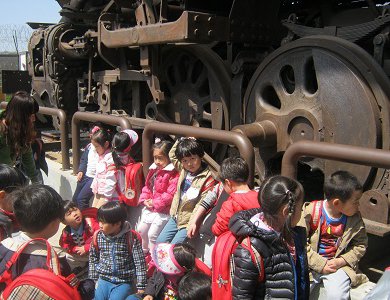
Rising from the rubbles of civil warof 70 years ago, South Korea has turned into an economic powerhouse of the world. South Koreans are continuing with their marchforward on the path of progress in a society of high tech industries, high economic progress,and modern cities, yetthey are not satisfied. Alongside prosperity, they want peaceful unification of the divided Korean Peninsula. Despite thehuge economic gap with North Korea, South Koreanswant reunification. As this year marked the 70th anniversary of the division and independence of Korea, the quest to resolve the tension on Korean peninsula for peaceful reunification continues. Given the determination for unification in South Korea, there are ample reasons to believe unification of Korea and dismantling of DMZ are possible
There are bunkers, electric fencesand high military movements around the DMZ, 20 kilometers from Seoul, to prevent unpredictable incidents on the border with North Korea, which monitors the activities on the South warily. Thealert on the border dividing the two Koreas is high.
Though heavily armed, the border remains calm and peaceful. United Nations Joint Command has been observing the eye-ball to eye-ball ceasefire of two armies of a million.Onthe Southern side,visitors are allowed to take the glimpses of this tense border, which still follows the strict code of the ceasefire.
Although some sporadic incidentshave taken place in the DMZ,pushing the two nations to the point of war, maximum restraints averted it. The usual sight is that the border guards are warily watching each other in thisrelatively peaceful border of the world.
Visitors of DMZ
Kim Sung Min, 12, does notknow about the tragedy and trauma following the division of Korea,yet he has a strong feeling about the need of unification for his country. Looking at the DMZ and beyond the border to North, Kim, a 5th grader, iskeenly focusing his binoculars for a view of the border town of North Korea.
“I want to go there on my own without any hindrance,” said Kim, with the help of aninterpreter.“One day weshould be able to travel to each other’s side freely.”
Jin Sin 14, a 7th grader,wants to visit North Korea without any difficulty and she prays these military obstacles should be removed. In DMZ with her parents, Jin wants peace, tranquility and open border for peoples of both the countries. “Korean Peninsula is one country, one culture and one language and. I cannot think of it as an outer world,” said Jin.
Kim and Jin are just two among hundreds of children and youth from South Korea, who visit the DMZ (Demilitarized Zone) andexpress similar sentiments about their divided land.
Some 6,700 people, from familiesseparated by the border are still living in the South, longing to meet their people in the North. It is heart-breaking because most of them are getting old and do not have much time left to fulfill their wish.
Unification Modality
Nobody knows about the opinion of people living in North Korea, but South Koreans still have hopes to see unification of Korean peninsula happening.
Mayor of Seoul Municipality Park Won-Soon reminds the reality. “In Korea, there is an old saying, ‘Ten years can change even the rivers and the mountains’.” However, there is a dream that has not changed even though 70 years have passed. It is the unification of Korea,” said Mayor Park.
Although various people have offered various modalities for unification for Korean peninsula, what most South Koreans seem to want is a peaceful reunification of Korea.
South Korea is now the eleventh largest economy of the world.South Koreans enjoy a much higher living standard than North Koreans, yet many people prefer to sacrifice certain economic gains for a certain period of time for the cause unification.
“After the unification, South Korea may have to pay the highest economic cost. Our physical and sentimental unification, however, is much higher than the economic value. Unified Korea can make the progress much faster,” said Honey Park, a tourist guide from Seoul.
Journalist for Unification
One hundred journalists from sixty countries had gathered to show solidarity with South Koreans at the event organized by Journalists Association of Korea to mark the 70th year of division of Korea.Association president Park Chong-Ryul had an unchallengeable commitment to independent journalism and unification of Korea.
“The theme the 70th Anniversary of the division of Korea: Rethinking about unification on the Korean Peninsula is chosen to draw the attention of World Journalists Forum 2015,” said President Park.
Likemost Koreans,journalists from around the world also issued a resolution. “Reconciliation and cooperation between the two Koreas and peace on the Korean peninsula are undeniable challenges of the time. Based on this understanding and marking the 70th Anniversary of Korean Independence and division of Korea, 100 journalists from 60 countries who participated in the World Journalists Conference 2015, wish for the new springs for peace on the Korean peninsula,” they declared in the Declaration of World Journalists for Peaceful Unification of Korea and Freedom of Speech.
Showing solidarity for a peaceful unification, the declaration also said that there is the need ofa continuing dialogue between the two Koreas consummated in the promise to seek peaceful co-existence and prosperity following the summit talks in 2000 and 2007. The declaration also expressed the concern that the dialogue has come to a standstill again leaving the tension on the Korean peninsula unresolved.
As the older generation, who fought the civil war and saw the devastation of the country is gradually disappearing, South Korea’s new generations, who are grown up in high economic prosperity,are questioning the essence of unification.
However, a majority of South Koreans still believe that North and South will unify sooner giving example of unification of East and Western Germany. Many South Korean scholars and journalists see the unification is going to be a reality sooner or later.
Speakers attending the recently held World Journalists Conference in Seoul held the view that Korean reunification is likely to open new options in Korean Peninsula and East Asia.
“It is quite evident that the ultimate objective of our policy vis-à-vis North Korea is peaceful unification of the South and North. However, it is imperative for us to expand our horizon beyond this ultimate destination, and pursue the policy of peaceful co-existence on the way leading to the peaceful unification of Korea,”Na Kyung-Won, chairperson of the Foreign Affairs of Unification Committee, the National Assembly of Republic of Korea, said.
“What is North Korea for us? The answer is, on the one hand, a serious security threat to us, on the other hand, a partner with which we have to work together on the way leading to the unification of Korea,” said Na Kyung-Won.
Despite stalling the peace process following the detonation of a nuclear bomb by North Korea, South Koreans believe that North Korea will come toa peaceful reunification process,giving up its ambition to have more nuclear bombs.
“A bigger challenge to our diplomacy is North Korea, which has yet to give up its nuclear ambitions and has been continuing to heighten tension on the Korean peninsula refusing to engage in dialogue,” said Cho Tae-yul, vice foreign minister of the Republic of Korea, addressing the World Journalists Conference.
“Germany, a divided nation until 25 years ago, has not only achieved reunification, but is also now taking the lead in the European integration process. Unfortunately, however, despite 70 years of the painful history of national division, distrust, conflict, tension still run high between the two Koreas,” saidvice minister Cho.
History of Korean Divide
The division of Korea into North and South was imposed upon the Korean people by outside forces, and many if not most Koreans insist that the two Koreas must one day be reunited.
The division of Korean peninsula began in 1948 with the government formed in both North and South with support from second war ally, dissolved USSR, and America. The civil war broke out in Korea on June 25, 1950, when North Korea, backed by the USSR, invaded the South and attempted to unify the peninsula by force.
In July 1953, after millions of deaths and enormous physical destruction, the war ended approximately where it began, with North and South Korea divided into roughly equal territories by the cease-fire line, a Demilitarized Zone (DMZ) that still forms the boundary between North and South Korea.
“Before becoming the mayor of Seoul, I spent three months travelling to Germany. I remember the same piece of advice that they gave to me. ‘The Berlin Wall did not fall in one day.’” Their advice was that the dream of unification will come true only when discussions appropriate for unification become a part of our daily lives,” said Park Won-soon, mayor of Seoul. “If the citizens of Seoul and Pyongyang can set aside their differences and understand each other and build the trust, the opportunity for peace and unification will come to us.”
The Two Koreas
Since 1953, North and South Korea evolved from a common cultural and historical base into two very different societies with radically dissimilar political and economic systems. The differences between North and South Korea today have little to do with pre-1945 regional differences between northern and southern Korea.
As North Korea has been heavily influenced by communist culture with one party and one man rule, South Korea, on the other hand, has been greatly influenced by the United States and its open economic and political system.
In the early 1970s, mid-1980s, and early 1990s, the two Koreas appeared to be reaching breakthroughs in inter-Korean relations, but each movement toward reconciliation and reunification ended in frustration.
South Korean Power
At the beginning of the twenty-first century, South Korea is among the major industrialized nations of the world and is widely recognized as a success in economic development and political democratization.
South Korea has evolved remarkably from the poor, backward country that emerged from the shadows of Japanese colonial rule in 1945. It is also a country with a strong sense of national identity and great pride in its culture, traditions, and accomplishments.
“We know how difficultit is to face the wound of a divided house. For 70 years, we have been waiting for an appropriate time for peaceful reunification of Korea and change inEast Asia,” said Chung Ui Hwa, chairman, National Assembly Korea.
Mayor of far southern city of Busan echoed a similar voice for unification of Korea. “Sooner or later, no one can stop the peaceful reunification of Korean peninsula,” said Suh Byung-soo, mayor of Busan.
Unification of Korea
Korea remains divided into North and South, with nearly two million men under arms on the peninsula and a high state of military tension. As it has for more than a century, Korea occupies a strategic place on the world map, and any conflict on the peninsula would have the potential to draw in neighboring countries, if not farther. Korea may no longer be a “shrimp,” but the waters it swims in are not yet entirely safe.
“We may not immediately see tangible results and the progress may be rather slow. But looking far into the future, we will continue to pursue this peace-building initiatives across the Korean Peninsula and Northeast Asia with patience and unwavering determination,” said vice foreign minister Cho Tae-yul.“Korea’s reunification is not mere a dream but a future that Korean people are committee to realizing.”
Koreans often use the proverb “when whales fight, the shrimp’s back is broken” to describe their country’s victimization at the hands of larger, more powerful neighbors. China, as the largest and most technologically and culturally advanced society in East Asia, exerted the most important outside influence on Korea until modern times.
“Finally, bigger challenge to our diplomacy is North Korea, which has yet to give up its nuclear ambitions and has been continuing to heighten the tension on the Korean Peninsula, refusing to engage in dialogue,” said Cho Tae-yul, vice foreign minister of the Republic of Korea.

Keshab Poudel
Poudel is the editor of New Spotlight Magazine.
- ECONOMY: Growth At 3.3
- Apr 16, 2024
- DPM’s SHRESTHA’S CHINA VISIT High Profile, Low Key
- Apr 14, 2024
- Maha Kumbha In Barahkshetra: A Sacred Festival In Sacred Koshi (Kaushiki) River
- Apr 09, 2024
- LOSS AND DAMAGE: Upper Tamakoshi A Case
- Apr 02, 2024
- Helvetas-Nepal’s InElam Promoting Herbal Oil In Sarlahi
- Mar 31, 2024















